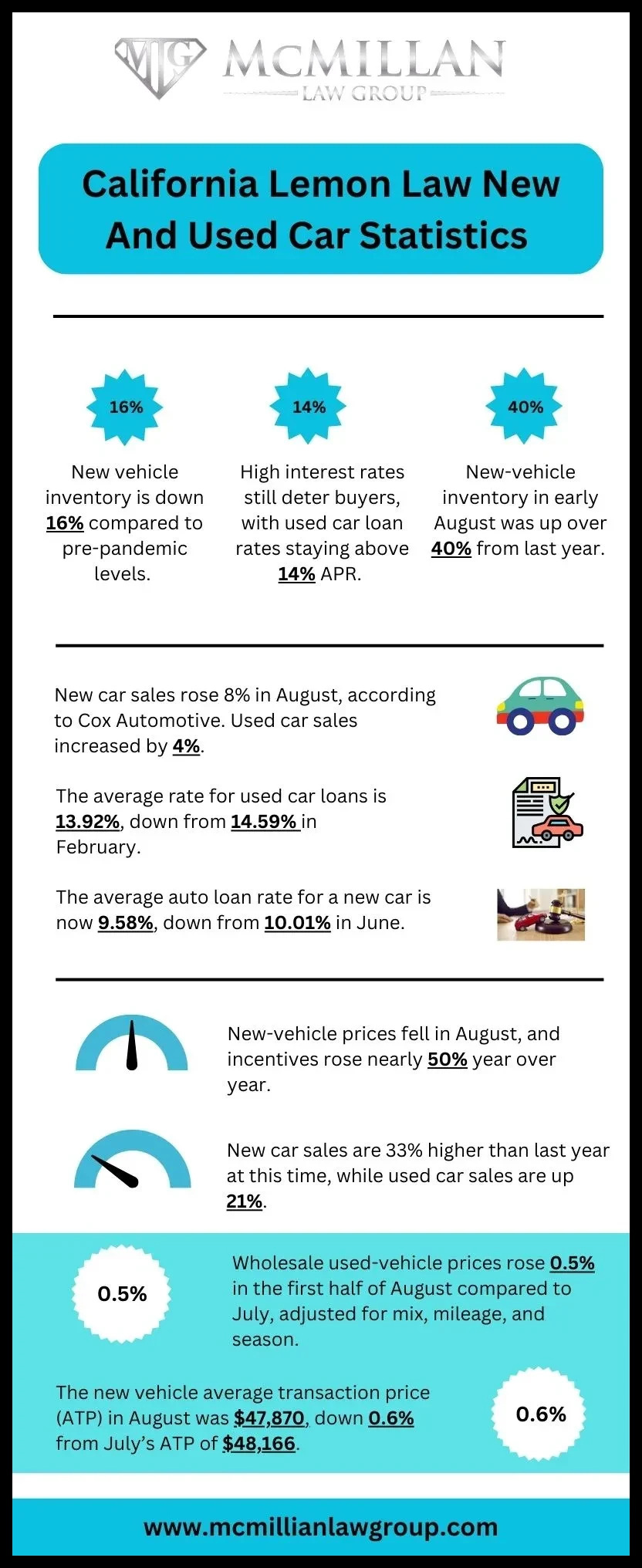Understanding the complexities of California’s Lemon Law can feel overwhelming, particularly in the context of used cars. This comprehensive resource, featuring valuable input from a legal expert specializing in Lemon Law, will empower you to fully grasp your entitlements within this legislation and ascertain whether your pre-owned vehicle meets the criteria.
Understanding California Lemon Law
The California Lemon Law, also known as the Song-Beverly Consumer Warranty Act, is designed to safeguard the rights of consumers who have bought or leased a faulty vehicle that the manufacturer or dealer has been unable to fix after a reasonable number of tries. It’s worth noting that this law doesn’t just cover new vehicles but also applies to used or second-hand vehicles that are sold with a manufacturer’s warranty. Under this law, consumers have the right to seek redress in the form of compensation, a replacement vehicle, or a refund if their vehicle is determined to be defective.
Key facts about California Lemon Law:
- This is relevant for both brand-new and pre-owned vehicles covered by the original manufacturer’s warranty.
- It includes coverage for both bought and rented vehicles, such as automobiles, vans, trucks, and certain recreational vehicles and boats.
- A ‘lemon’ is a term used to describe a vehicle that has a significant warranty-covered defect that has not been resolved after multiple repair attempts.
Signs that Your Pre-Owned Vehicle Might Qualify under California Lemon Law
To determine if your pre-owned vehicle qualifies under California’s Lemon Law, look for these signs:
- Persistent Issues: If your car has a persistent defect that affects its functionality, worth, or safety despite multiple repair attempts, it might be considered a lemon.
- Multiple Repairs: When a vehicle defect cannot be fixed after a certain number of attempts, usually two or four, depending on the seriousness of the defect, the law becomes involved.
- Out of Service: If your vehicle has been in the repair shop for over 30 days, the Lemon Law could potentially be relevant to your situation.
Steps to Take If You Suspect Your Pre-Owned Vehicle Is a Lemon
If you believe you’ve purchased a lemon, here’s what you should do:
Keep Detailed Records
Thoroughly document all vehicle repairs, including dates, issues, and repair duration, for reliability assessment. Detailed records aid warranty claims and legal disputes. Record-keeping helps track maintenance history and identify recurring issues for informed decision-making.
Contact the Manufacturer
In case you face the same problem with your car multiple times, it’s important to quickly inform the car manufacturer or dealer with detailed information about the issue. Clearly express your concerns and frustrations, emphasizing that the problem persists despite previous attempts at resolution. Mention the steps you’ve taken to address the problem and provide any relevant documentation, such as service records or repair invoices. Clearly state your intention to pursue a lemon law claim if the issue continues, highlighting your rights as a consumer.
This proactive approach not only formally notifies the responsible parties but also creates a record of your efforts to address the issue before taking legal action. It may also prompt the manufacturer or dealer to take swift and effective measures to resolve the problem and ensure customer satisfaction.
Consult a Lemon Law Lawyer
If you’ve tried multiple times to solve the issue without success, consider seeking advice from a California Lemon Law lawyer. They can assist in clarifying your rights, walking you through the steps, and advocating on your behalf if needed.
Expert Insights from a Lemon Law Lawyer
Attorneys specializing in Lemon Law bring extensive expertise from handling a wide range of cases. They stress the significance of maintaining thorough documentation for all repairs and interactions with the dealer or manufacturer. Additionally, they underscore that the law covers not only recurring problems but also defects that substantially impact the vehicle’s functionality, worth, or safety.
Legal Procedures and Options
If a car is considered a lemon, the law mandates that the manufacturer must either buy it back or provide a replacement. If the manufacturer refuses to do so, legal action may be necessary. In such situations, a Lemon Law attorney can advocate on your behalf, handle negotiations, and potentially litigate the matter if needed. Alternatively, some manufacturers offer arbitration programs as an informal and quicker alternative to resolving disputes compared to going to court.
Recent Developments and Updates in California Lemon Law
The Lemon Law in California is constantly improving to offer increased protection for consumers. A notable change is the expansion of the law to include used vehicles that are still covered by the manufacturer’s original warranty. This expansion has greatly broadened the law’s protective reach, bringing relief to a larger number of consumers.
Tips for Preventing Lemon Law Issues with Your Pre-Owned Vehicle
To avoid potential Lemon Law issues:
- Always have the vehicle inspected by a trusted mechanic before purchase.
- Review the vehicle’s repair history.
- Make sure the vehicle comes with the manufacturer’s original warranty.
- Keep detailed records of all repairs and communications with the dealer or manufacturer.
Understanding California Lemon Law for your used car is vital, offering protection against faulty vehicles. Recognizing the signs of a lemon and taking proactive steps can turn a frustrating situation into a favorable outcome. If unsure, seeking advice from a skilled Lemon Law attorney is crucial. A Lemon Law consultation provides personalized guidance, allowing for a thorough discussion of your case and exploration of potential actions to protect your consumer rights.




